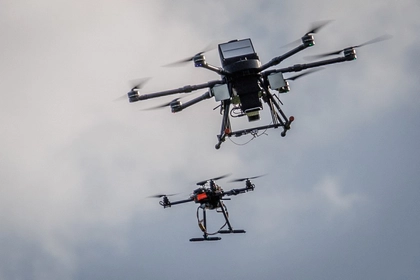Russian President Vladimir Putin on Tuesday hailed North Korea for "firmly supporting" Moscow's war in Ukraine ahead of a visit to Pyongyang set to boost defence ties between the two nuclear-armed countries.
Historic allies since North Korea's founding after World War II, Moscow and Pyongyang have drawn closer after Russia's invasion of Ukraine in 2022, with Putin increasingly isolated internationally and looking for friends.
JOIN US ON TELEGRAM
Follow our coverage of the war on the @Kyivpost_official.
North Korea's Kim Jong Un made a rare overseas trip on his bulletproof train last September to meet Putin at a Russian spaceport, with Seoul subsequently claiming Pyongyang was shipping arms to Moscow for use in Ukraine, in exchange for Russian satellite know-how.
Putin's trip has triggered "concern" in Washington, after the Pentagon said last month debris analysis proved North Korean ballistic missiles were already being fired on Ukraine's battlefields.
"We highly appreciate that the DPRK is firmly supporting the special military operations of Russia being conducted in Ukraine," Putin wrote in an article carried by the official Korean Central News Agency, referring to the North by its official name.
Russia and the North are "now actively developing the many-sided partnership," Putin wrote ahead of his arrival later Tuesday in the North, for his first visit since 2000 when he met then-leader Kim Jong Il -- Kim Jong Un's late father.
The trip will elevate ties to a "higher level" the Russian leader wrote, adding it would help develop "equal cooperation" between the two allies.

Ukraine Reportedly Strikes 4 Alcohol Distilleries in Russia in Drone Attacks
Both countries are under rafts on UN sanctions, Pyongyang since 2006 over banned nuclear and ballistic missile programs, and Moscow over the invasion of Ukraine.
Putin praised the North for "defending their interests very effectively despite the US economic pressure, provocation, blackmail and military threats that have lasted for decades."
He also hailed Moscow and Pyongyang for "maintaining the common line and stand at the UN."
- 'Lonely bromance' -
North Korea has denied sending weapons to Russia, calling the claim "absurd" -- even as it thanked Moscow for using its UN veto in March to effectively end monitoring of sanctions violations, just as UN experts were starting to probe alleged arms transfers.
Kim has also ramped up weapons testing, including a flurry of launches this year of cruise missiles, which analysts said North Korea could be supplying to Russia for use in Ukraine.
UN sanctions on the North "are frankly disadvantageous to us" Alexander Zhebin, head of the Center for Korean Studies at the Russian Academy of Sciences told RIA Novosti.
"Perhaps something will be done during this visit," he added.
The United States is was "concerned" about the trip because of the security implications for Ukraine -- and South Korea, National Security Council spokesman John Kirby told reporters.
"We know North Korean ballistic missiles are still being used to hit Ukrainian targets (and) there could be some reciprocity here that could affect security on the Korean peninsula," he said.
Ukraine's Foreign Minister Dmytro Kuleba dismissed the trip as a "lonely bromance" between Putin and North Korean leader Kim Jong Un, with NATO's Secretary General Jens Stoltenberg saying it showed how Putin was "dependent" on authoritarian leaders.
- Defence cooperation -
Citing a Kremlin aide, Russian agencies said Monday the two leaders will sign "important documents" during the visit.
This may include a "comprehensive strategic partnership treaty" which will outline future cooperation and deal with "security issues", Kremlin aide Yuri Ushakov was quoted as saying by state-run Russian news agencies.
The trip is all about defence cooperation, experts said.
"Certainly both countries are facing serious economic dilemmas. But regardless of the words used, current relations will focus on defense cooperation," Patrick Cronin, chair for Asia-Pacific Security at the Hudson Institute, told the Yonhap news agency.
Putin's trip to the North is "two strongmen with weak economies basking in the limelight as leaders to swap military technology and subvert the US-led order," Cronin told Yonhap.
Pyongyang is eager for high-end military technology to advance its nuclear, missile, satellite and nuclear-powered submarine programs, while Moscow needs a steady supply of weapons for its war in Ukraine, experts say.
The North could promise "to provide Russia with continuing supplies of artillery, guided rockets for multiple rocket launchers, and short-range missiles to support Russia's operations in Ukraine," Bruce Bennett, senior defense analyst at RAND Corp. told Yonhap.
In return, it will want "Russia to provide a variety of advanced technologies," he said, plus "a substantial flow of Russian oil and food products along with hard currency payments."
You can also highlight the text and press Ctrl + Enter






